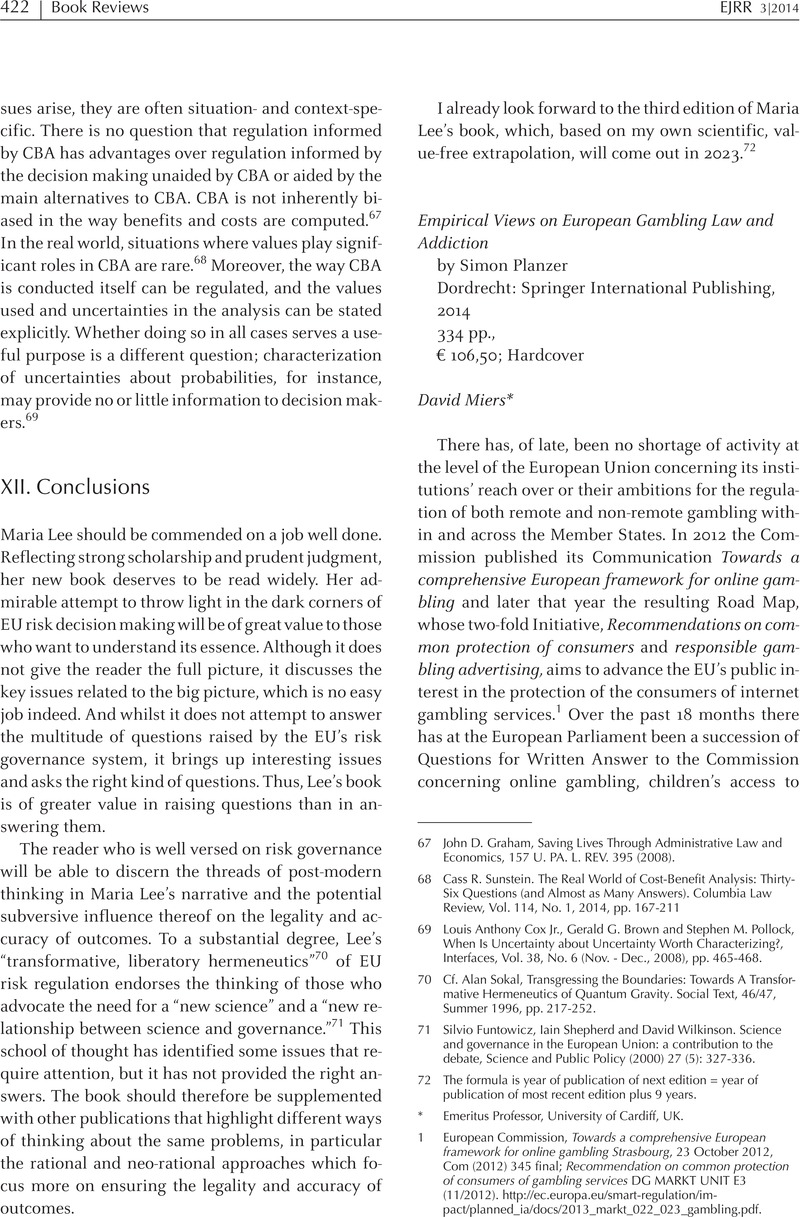No CrossRef data available.
Article contents
Empirical Views on European Gambling Law and Addiction by Simon Planzer Dordrecht: Springer International Publishing, 2014 334 pp., € 106,50; Hardcover
Published online by Cambridge University Press: 20 January 2017
Abstract

- Type
- Book Reviews
- Information
- Copyright
- Copyright © Cambridge University Press 2014
References
1 European Commission, Towards a comprehensive European framework for online gambling Strasbourg, 23 October 2012, Com (2012) 345 final; Recommendation on common protection of consumers of gambling services DG MARKT UNIT E3 (11/2012) http://ec.europa.eu/smart-regulation/impact/planned_ia/docs/2013_markt_022_023_gambling.pdf.
4 Her Majesty's Customs and Excise v Gerhart Schindler and Jörg Schindler, Case C-275/92 (24 March 1994).
5 HIT hoteli, igralnice, turizem dd Nova Gorica and HIT LARIX, prirejanje posebnih iger na srečo in turizem dd v Bundesminister für Finanzen, Case C-176/11 (12 July 2012) [24], citing Liga Portuguesa de Futebol Profissional and Bwin International, Case C-42/07 (14 October 2008) [59]-[88].
6 Planzer notes (p. 238) that the Swiss Institute of Comparative Law, Study of Gambling Services in the Internal market of the European Union (2006) counted nearly 600 cases concerning gambling before the Court.
7 For a time it seemed to some commentators that the opinions of Advocates-General Alber in Criminal proceedings against Piergiorgio Gambelli and Others, Case 243/01 (6 November 2003) and Colomer in Criminal proceedings against Massimiliano Placanica and others, Case 338/04 (6 March 2007), indicated that there might be some mileage in the notion of the mutual recognition of the terms of an operator's licence in its Member State. But the idea of a ‘regulatory passport’ to cross-EU gambling facilities has been thoroughly quashed in a series of later decisions (see Planzer pp. 202-206); most recently in the Biasci case: Reference for a preliminary ruling from the Tribunale Amministrativo Regionale per la Toscana (Italy) lodged on 27 December 2011 - Daniele Biasci and Others v Ministero dell'Interno, Questura di Livorno, Case C-660/11 (12 September 2013). ‘The Court has held previously in that regard that, in the light of the wide discretion the Member States have in relation to the objectives they wish to pursue and the level of consumer protection they seek and in the absence of any harmonisation in the sphere of betting and gaming, in the present state of development of European Union law there is no obligation of mutual recognition of authorisations issued by the various Member States’ [40].
8 This view is equally shared by the Commission, which has systematically excluded gambling from its legislation; for example in para 25 of the Preamble to the Services Directive: ‘Gambling activities, including lottery and betting transactions, should be excluded from the scope of this Directive in view of the specific nature of these activities, which entail implementation by Member States of policies relating to public policy and consumer protection’; DIRECTIVE 2006/123/EC OF THE EUROPEAN PARLIAMENT AND OF THE COUNCIL of 12 December 2006 on services in the internal market.
9 In the Markus Stoss case, C-316/07, (8 September 2010), which dealt extensively with the position of advertising, the Court was perhaps more robust in its views, concluding (at the risk of being over–selective in the following quotations), that ‘such advertising cannot, however, in particular, aim to encourage consumers’ natural propensity to gamble by stimulating their active participation in it, such as by trivialising gambling or giving it a positive image due to the fact that revenues derived from it are used for activities in the public interest, or by increasing the attractiveness of gambling by means of enticing advertising messages depicting major winnings in glowing colours’ [103], and that in such a case, the ‘national court may legitimately be led to consider that such a monopoly is not suitable for guaranteeing achievement of the objective for which it was established, of preventing incitement to squander money on gambling and combating addiction to the latter, by contributing to reducing opportunities for gambling and limiting activities in that area in a consistent and systematic manner’ [107(iv)].
10 Markku Juhani Läärä, Cotswold Microsystems Ltd and Oy Transatlantic Software Ltd v Kihlakunnansyyttäjä (Jyväskylä) and Suomen valtio (Finnish State), Case C-124/97 (21 September 1999).
11 Supra, n. 1.
12 Diana Elisabeth Lindman. Case C-42/02 (13 November 2003).


